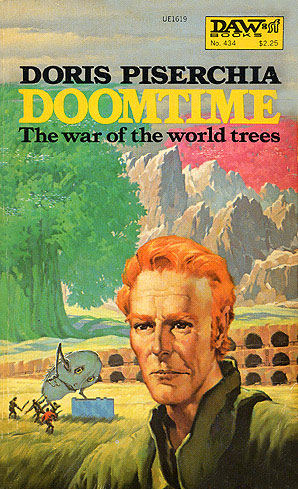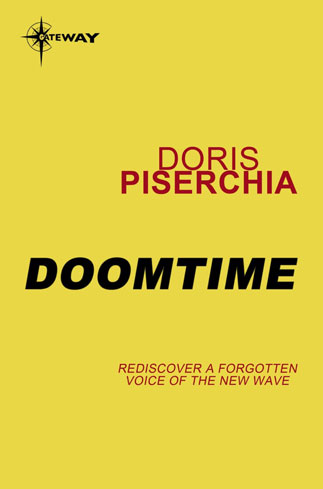

Left: Doris Piserchia, Doomtime paperback cover (DAW books, 1981)
Right: E-book cover for the same book (Gateway books, 2012)
Much of the writing about science fiction writer Doris Piserchia laments her disappearance from publishing in the mid '80s and the subsequent, unjust lack of interest in reprinting her thirteen novels: brilliant and rather eccentric imaginative tales appearing between 1973 and 1983, graced with pulp covers (see above left). SF critic John Clute classified Piserchia as a "new wave" writer, which would put her in the august company of Delany, LeGuin, Aldiss, et al, although she worked in several genres (subversively).
Now, at last, six of her novels have been published as e-books by Gateway, a subsidiary of Hachette UK, with more promised to come soon. Still classed as science fiction, but we take our gains as they come.
In case you're wondering what's up with that orange-haired man, that's Creed, denizen of a far future Earth where humans are bit players in a struggle between two malevolent, Everest-sized trees. The roots and shoots of Tedron and Krake (as they are known) straddle the entire globe, and fight like slowly-writhing snakes in areas of contested geography. An Amazon reader review details some of the bizarre qualities of the world in Doomtime:
...fungus creatures which meld with humans, strange fungus pools that unravel people's psyches, humans sucked dry by Tedron and Krake, humans mutated beyond recognition by the trees, humans turning into trees, fuzzy smallish fungus which grow around peoples' necks, addicted humans stuck in hibernating trees desperate to meld...
The most disturbing element of this novel is how little the humans have control over their situation. Entire groups of humans are transformed by these trees: humans are in no way the superior lifeforms. Piserchia is the master at showing instead of telling, often in an offhand matter of fact way which intensifies the dread and unease. This has to be one of the more unusual and disturbing worlds I've ever read about.
The book has a quality of lucid dreaming but always with a sense of structure and purpose.
As we kill off species and muck about in the gene pool it's not impossible to imagine a future Earth where nature shifts the balance and humans bow to sentient super-colony organisms, a la Kudzu vines run amuck. But environmental jeremiad lies more or less in the background here; Piserchia ponders what people will be like in this changed world and it's mostly an ignoble bunch: addicts and vainglorious asses stumbling around in a fog of hallucinatory confusion. Creed is our POV character who gradually gets a clue and starts considering what can be done about the trees, using bits of super-powered "old tech" left around the landscape by his remote ancestors. That's a classic genre hook but it's those imaginative details told in an offhand tone that make this "lit."
